Italian Counterfeit Ruling Protects Dior Book Tote and Stripe

- Oops!Something went wrong.Please try again later.
PARIS — Dior’s Book Tote, and its signature central multilayer stripe, are now protected against counterfeiting, the brand said Monday, adding that it continues to battle a spike in online sales of fake goods since the outbreak of the coronavirus pandemic.
In a preliminary ruling rendered on June 3, and published today on WWD.com and in Italian daily newspaper La Nazione, the District Court of Genoa in northern Italy recognized the French fashion house’s exclusive right to the bag, launched in 2018, in addition to the five horizontal stripes that appear on it.
More from WWD
“As a distinctive Dior trademark, these five alternating horizontal stripes thus benefit from exclusive trademark protection, making it possible to identify Dior creations independently of the Christian Dior inscription,” Dior said in a statement.
“This recognition of the five stripes as Dior property is an important court/legal precedent, as such trademark is used on the ensemble of Dior products, above and beyond the Dior Book Tote,” it added.
Dior launched the legal proceedings in Italy against a counterfeiter who sold fake Dior Book Tote bags.
Pietro Beccari, chairman and chief executive officer of Christian Dior Couture, said the Genoa ruling was significant because it means that Dior can take legal action against anyone using its signature stripe motif, even if they don’t use the brand name.
The court determined that the five-part band has a strong original character, and is in itself capable of indicating the origin of the product; the lack of writing is not decisive for the recognition of the infringement, and the band, without the literal elements, is widely used by Dior as a decorative and at the same time distinctive element of its products, he said.
The design was first presented as part of women’s artistic director Maria Grazia Chiuri’s spring 2018 collection. From fall 2018, the five stripes also appeared on J’Adior bracelets and subsequently became widely used in the brand’s ready-to-wear and accessories such as scarves, shoes and bracelets.

Courtesy
The Book Tote bags can be customized with the client’s name, and have been issued with the names of destinations such as Mykonos, Capri or Portofino for the house’s seasonal Dioriviera pop-up stores.
Beccari said LVMH Moët Hennessy Louis Vuitton, the parent company of Dior and other brands including Louis Vuitton, Fendi, Tiffany & Co. and Guerlain, spends more than 40 million euros per year on anti-counterfeiting operations and has dedicated teams of specialists coordinating actions with law enforcement authorities and e-commerce and social media platforms.
“Counterfeiters follow the legitimate markets and sales channels and they are therefore present online as well as offline. In addition, they react very quickly to new trends and the COVID-19 pandemic has accelerated the digital transformation and massively increased the use of the internet to promote and sell counterfeits,” he said.
“In this regard, social media platforms have become a very popular channel for counterfeiters and our takedowns of illegitimate content have sky-rocketed on social media, while those on e-commerce platforms have seen massive increases as well. To give you an idea: LVMH has removed more than 11 million illegitimate contents from the internet in 2020,” Beccari added.
He highlighted the link between counterfeiting and organized crime including money laundering, drug trafficking and child labor. “Buying counterfeit products fuels these criminal activities,” the executive said.
In a bid to help consumers trace the provenance and authenticity of luxury goods, LVMH recently joined forces with Prada Group and Compagnie Financière Richemont to form the Aura Blockchain Consortium, which will promote the use of a single blockchain solution open to all luxury brands worldwide.
Blockchains can help consumers trace the provenance and authenticity of luxury goods throughout their life cycle, and help brands fight against counterfeiting and parallel marketing.
SEE ALSO:
Retail Trade Group Targets Counterfeit Marketing on Social Media
Gucci, Facebook File Joint Lawsuit in Counterfeit Fight
How Blockchain Can Help Authenticate Ownership of Fashion Goods
Sign up for WWD's Newsletter. For the latest news, follow us on Twitter, Facebook, and Instagram.

